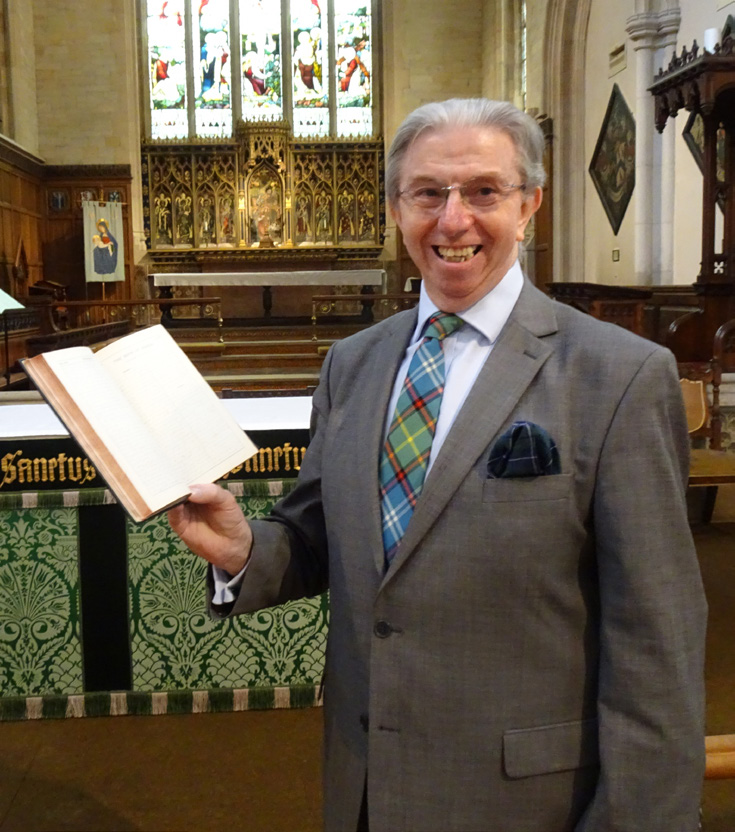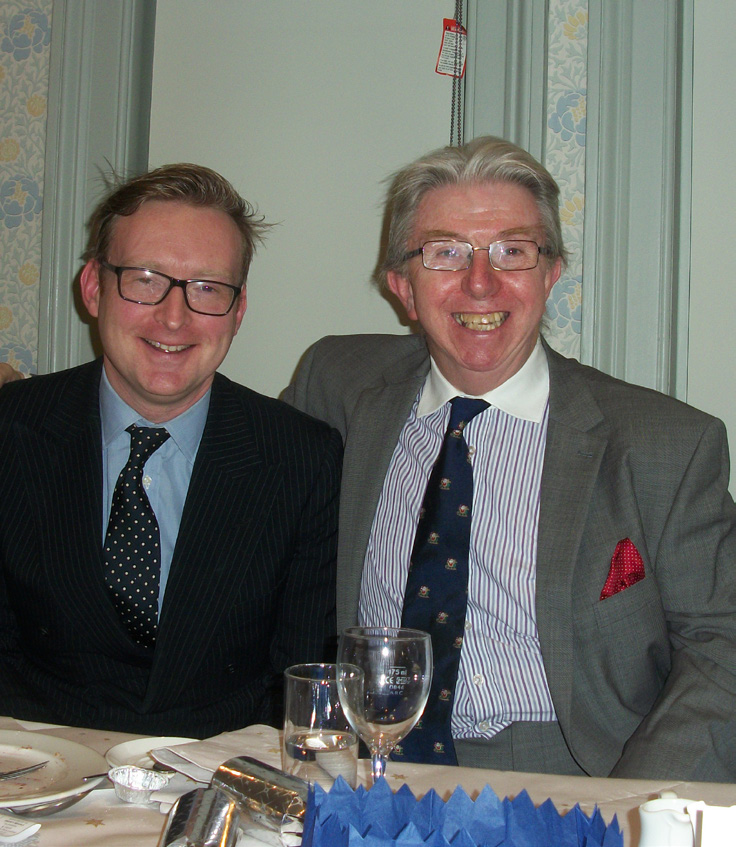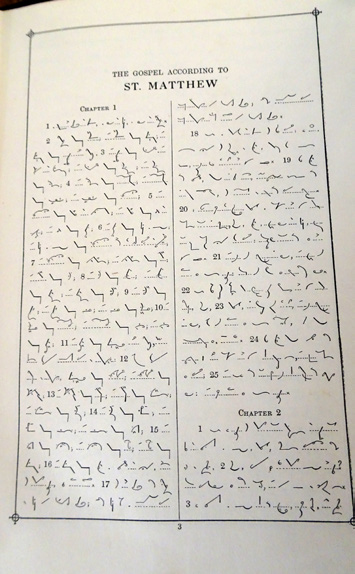PROFILE
From Stevenston to shorthand
Jackie Macadam meets church member John Dawson whose shorthand skills have taken him from Ayrshire to the Houses of Parliament.
“SHORTLY after I started to learn shorthand, in my first examination, I got almost 100% with about one error. When the teacher read out my mark, the rest of the class applauded. This was a big boost to me as I was the only boy in my class and the first ever boy to learn shorthand at Stevenston High School.”
John Dawson is a member of St Columba’s in London, and has attended Crown Church of Scotland in Covent Garden since 1985. Every week when he goes to the services, he carries a Bible – but it’s one that not everyone can read. It’s in Pitman’s Shorthand .
John was recently elected as President of the Incorporated Phonographic Society (www.the-ips.org.uk), the oldest society of shorthand writers in the world, and has met some of the Pitman family in person.
“I was christened in Ardeer United Free Church, the same church my mother grew up in, where my parents were married, and where my father, William Dawson, was session clerk for many years.”
As well as Ardeer, John enjoyed attending his first Sunday School at his local Salvation Army group in Saltcoats. Some of his relatives attended church there and encouraged him to come along.
But John’s real love at that time was the Boys’ Brigade. He joined the Life Boys initially, and then the 1st Stevenston Company. He stayed with the BB for many years, achieving his Queen’s Badge, the highest award in the BB.
“I have so many happy memories of my time in the Boys’ Brigade,” he recalls.
“I especially loved the Boys’ Brigade camp and staying at Hanover Street School in Aberdeen. The first time I was there, I won a talent contest, singing Nobody’s Child.”
John had always fancied office work and wanted to do it really well, so he studied shorthand, book-keeping and typing. In 1969 he was Dux for Commercial Subjects at Stevenston High and won the Mr Dawes Prize in Commerce at Ardrossan Academy the following year.
“All this, and an earlier headmaster had told me that my IQ was a disgrace, and that I should leave school at 15,” John laughs.
But shorthand had got a real grip on him. “I was just fascinated by it,” he said. “This strange language of lines and squiggles that conveyed so many words in such a short time.
“I used it all the time. I used to practise by taking down articles from the evening news, trying to keep up with the newscaster. When I was in church, I would transcribe the sermons, especially when they were relevant to me and my life. At school, my shorthand teacher said I was a ‘shorthand genius’ and every Friday there would be a shorthand magazine called ‘Memo’ and quite often, other students would ask me to read their horoscopes to them, because, though they knew the shorthand, I was a much quicker reader of it than they were.
“That was a huge boost to me. I’d sometimes struggled at school, and to be recognised as having an outstanding ability in shorthand, was a really positive experience.”
“After school I went to college and did a Diploma in Commerce and graduated in 1974.
“It was a bad time to leave school, as unemployment was rife, particularly in North Ayrshire. One of my college tutors had mentioned the OECD (the Organisation for Economic Co-operation and Development) which was based in France. I applied for a job there that I spotted in a local newspaper for shorthand-typists to work in Paris. After an interview in London, I was offered a job, and off I went to Paris!
“These were some of the happiest times in my life. I made many good friends including Kazuro Iida, a young Japanese man who I met in 1978 and we are still friends today.”
The church was still a really important part of John’s life and he went to the Scots Kirk in Paris every Sunday morning as well as attending their Scottish Country Dancing group on a Friday night, 10 francs for the evening.
“Another typist told me about a group of young people who attended St Michael’s Church of England and I began going there in the evening. It was there I became friends with Justin Welby, now the Archbishop of Canterbury, and we have remained friends. I attended his wedding at Holy Trinity Brompton, London in 1979.”
With a top speed of over 220 words per minute (a good speed is around 80 – 100), John was in demand, and in the 1980s he worked for the Council of Europe in Strasbourg.

John Dawson with Shorthand Bible
That was a huge boost to me. I’d sometimes struggled at school, and to be recognised as having an outstanding ability in shorthand, was a really positive experience.
He says it really is a universal language, having met fellow shorthand writers from all over the world, including Europe, New Zealand, America, Canada and Asia.
“After I left Paris, I worked with the World Intellectual Property Organisation and then the World Health Organisation thereafter.
“I went to the Church of Scotland in Geneva and was proud to sing in the choir there.”
Home called though, and after several years working in France and Switzerland, he decided to return to Scotland, where he completed a postgraduate course in Management at Strathclyde Business School and then moved to London to work at HM Treasury. Two years later, he was off to Strasbourg to work at the Council of Europe.
He never imagined, while he was at school in Ayrshire, that shorthand would take him round the world.
“After Strasbourg, I worked with British Gas for about eight years, then I joined the Civil Service and became a police civilian worker. I joined the Christian Police Association, and I’m proud to be a member to this day,” he says.
His skills brought him to the notice of Parliament – first in the House of Lords, and then working for a number of MPs in Westminster.
“After the House of Lords, I went to work for Bob Blackman, MP for Harrow East in 2010,” he says. “Life was interesting! With Bob Blackman I did casework and dealt with a wide range of topics including housing, immigration and obtaining benefits for people.
“Working in Parliament, I would use my shorthand daily, taking notes, telephone calls, and meetings, verbatim.
“After working for more than five years with Bob, I got another job working with the Rt Hon Sir Oliver Letwin who for 23 years until December 2019 was MP for West Dorset. I was Sir Oliver’s constituency support manager for more than four years and in this job I dealt with casework and arranged surgeries, organised visits for constituents to come to parliament perhaps as members or a group, on a school visit or individually. I also made arrangements for constituents to come to Prime Ministers Questions (PMQs). I would often take constituents on tours of the Palace of Westminster and take them for lunch or a drink on the House of Commons Terrace.

John Dawson with Damian Pitman
I simply thank God that I have been blessed with the ability to write Pitman’s shorthand and I have met so many friends and experienced so many happy, exciting and wonderful times through my use of shorthand...
“Throughout the course of this work I would use my shorthand daily and I have a folder at home full of thank you emails, letters and cards that I have received from grateful constituents. When Sir Oliver stood down last year he presented me with several presents including a bottle of House of Commons champagne signed by Theresa May.”
John is currently senior caseworker for Nickie Aiken, MP for the Cities of London and Westminster.
He was first told about the IPS by a librarian at the Ministry of Defence. He went along to some meetings, and says he was ‘over the moon’ to be accepted as a fellow.
“About a year or so after I joined the IPS, I wrote an article for the Journal entitled ‘The influence of shorthand on my life’. It was read by a member in New Zealand, Joyce Ennor, a lady in her 70s at the time but she was so impressed by my story that she wrote to the editor and enclosed a letter written in Pitman’s shorthand addressed to me.
“I could hardly believe that a lady all those miles away in her seventies, who had sons older than me, would be so impressed by what I had written. I replied to Joyce, and this began a long friendship until Joyce’s death a few years ago. Joyce and her family invited me to New Zealand but I never thought I would go. However, when my mother died in March 2001 my cousin suggested that, as I had always spent every Christmas in Stevenston, I should do something entirely different.
With experience, I have become hardened to things and very little shocks me but I am aware of cruelty towards myself and to others but I have learnt to cope with this and never to lose my faith in God.

Pitman Shorthand Bible
Therefore, I wrote to Joyce in Pitman’s shorthand and asked if it would be OK for me to come to spend Christmas and the New Year with her and her family in New Zealand. Joyce replied saying that she and her family would love to have me, and I went to New Zealand in December 2001, initially booked for three weeks but this was extended to five weeks. At about 12.30 am on Christmas morning at St Christopher’s Church, Christchurch New Zealand I sang a solo The Holy City and this was received very warmly by the congregation and at the reception afterwards many people came up to me and said that they enjoyed my singing so much I should sing again another time.
“On the Sunday before I returned to the UK from New Zealand the minister asked me to sing Jesus Loves Me and one or two other songs at the church that morning. This was met with great warmth by the congregation and I received many compliments from them afterwards.
“When Joyce died, her son wrote to me and said his mother had left me her shorthand bible in her will and I have it in my bookcase to this day.”
But Christmas is a special time for John. Not surprisingly, many of his cards are in shorthand!
“At Christmas time several of my shorthand writing friends send me Christmas cards and they write a greeting in shorthand within the card and I send my greetings to them also in shorthand. The use of shorthand for personal and business use is still very much active today, and I am sure that shorthand has a glowing future.
“I simply thank God that I have been blessed with the ability to write Pitman’s shorthand and I have met so many friends and experienced so many happy, exciting and wonderful times through my use of shorthand and I can honestly say that I have no real regrets and I have had a very interesting and fruitful life and I am very happy and content with my career.
“However, throughout my life I have always maintained a very close bond and deep faith in God and my Christian faith. Things have not always been easy and I have had many dramatic, challenging and hurtful times but with my faith in God and love and friendship from others I have always been able to pull through and help others in any way I can.
“I have been blessed with wonderful friends and family throughout the low and distressing points in my life and I have always found time to pray to God to help me through and he has never let me down.
“My faith has never seriously been challenged by things I have listened to or transcribed but I have written a lot of distressing stories particularly about redundancies, death of loved ones and abuse of various kinds of other people. With experience, I have become hardened to things and very little shocks me but I am aware of cruelty towards myself and to others but I have learnt to cope with this and never to lose my faith in God.”
But being so prolific in shorthand has occasionally raised some eyebrows.
“I remember one occasion when I attended a bible study at a house group in Solihull and the retired wife of a vicar who had been a vicar for about 60 years saw me with my shorthand bible. She looked at it quite hard, and asked cautiously, if that was Arabic! I said ‘no’ and explained it was Pitman’s shorthand! It’s interesting that although many ministers have read many versions of the bible, few, even including my previous minister at St Columba’s the Very Rev Dr John H McIndoe, realised that the bible was written in Pitman’s shorthand. They’re hard to come by, but I love mine!” ¤